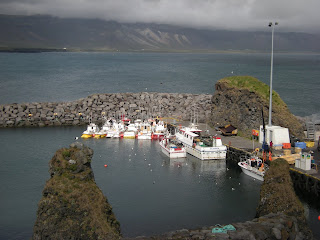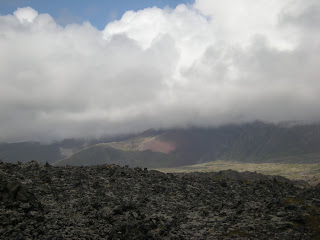I woke with a start and checked my watch. It was almost 8:30am when the fire drill was scheduled. I dressed as quickly as possible and headed out. I had to come back for my life jacket. The drill involved going to the theatre on the 4th deck and listening to a lecture on what was to be done. We then headed to the outside deck to pass by the life boat, which holds about 150 people. Fortunately the dining room had not closed so I was able to get breakfast.
After breakfast, I sat on one of the outside decks for a while and read. There was a lecture scheduled for 10:30 which I didn’t want to miss. It turned out the original speaker had to disembark for health reasons connected with his wife with the result that the other professor spoke. His subject was early Icelandic history, society and culture. Apparently Iceland was the penultimate land to be inhabited by people. For a short while, Irish and Scots Monks lived in caves, but when the Vikings came, they left because they did not wish to live with pagans. Iceland was settled by members of powerful Norwegian families around 870 CE. These families had a dispute with the Norwegian king. Icelandic culture was rural. No one could become rich farming in Iceland because the soil is poor and the growing season is short. It was and still for the most part is animal husbandry. Cities did not develop until the 18th century. The Icelandic society was unlike anything in existence at the time. There were chieftains to whom particular farmers owed loyalty. When a problem developed, the chieftain would convene the locals to discuss the issue and try to resolve it. If they could not resolve it on the local level, they would appeal to the “Althing”, which was a national council to try to resolve the issue. There was no method of enforcement, but people tended to respect the decisions of the “courts”. It was a relatively democratic system that worked well for a few hundred years.
After lunch, which I ate out on deck, we boarded a bus for a tour of the Snaefellsnes Peninsula. Most of the terrain is volcanic and occasionally, you will see weird shaped rocks, which with a little imagination can be turned into magical figures. There were several optional hikes, which I took part in. There were not long or difficult, but there were a few places where I had some trouble owing to my fear of heights and poor balance. We returned to the ship with an hour to prepare for the Gala evening involving the Captains Welcome reception.
The Reception was pleasant. The dinner was fixed, but of high quality. I had a pleasant evening until the rocking and rolling of the ship got to me. I spoke with one of the ship’s officers and was taken to the medical office where I was given a patch. The price of the patch was 20 Euros which is about $30. I felt a little queasy until I went ashore the next day on Grimsey.
Entering Snaefellsnes Peninsula
Arriving at Snaefellesnes Peninsula, which is first port of call
 First stop in Budir
First stop in Budir Local Church which is unusual because it is painted black
Local Church which is unusual because it is painted black Inside church
Inside church View from Church Yard - Note Waterfall
View from Church Yard - Note Waterfall Local Hotel said to be quite nice
Local Hotel said to be quite nice
Views from Church yard
View from Church yard
 Bardur Snaefellsas
Bardur Snaefellsas Half Man and half troll
Half Man and half troll Bardur Snaefellsas
Bardur Snaefellsas Note my hood is up because I'm cold
Note my hood is up because I'm cold Volcanic cave created by sea action
Volcanic cave created by sea action Volcanic Cave
Volcanic Cave Weird rock shapes created by volcanic activity and sea action
Weird rock shapes created by volcanic activity and sea action Volcanic activity creates weird shaped rocks
Volcanic activity creates weird shaped rocks Action of sea against volcanic rock
Action of sea against volcanic rock Weird rock shapes
Weird rock shapes Mountain in the distance
Mountain in the distance Name of Village?
Name of Village? Typical Volcanic shaped rocks
Typical Volcanic shaped rocks Looking out to sea
Looking out to sea Fishing Village
Fishing Village Fishing Village
Fishing Village Bringing in the Catch
Bringing in the Catch Name of Village - Snaefellsbaer
Name of Village - Snaefellsbaer Description
Description Map
Map Sign
Sign Hiking
Hiking White Liken
White Liken Trying to pick up rocks
Trying to pick up rocks Informational Sign about ship wreck
Informational Sign about ship wreck Beach where British ship was wrecked
Beach where British ship was wrecked Beach with black sand which is common in Iceland
Beach with black sand which is common in Iceland Lava Field
Lava Field Horses of the road on the way back to the ship
Horses of the road on the way back to the ship
No comments:
Post a Comment